ALBAWABA - Chinese telecommunications giant Huawei did not reveal any details about its new smartphone or announce any significant changes in its chips during a high-profile launch event on Monday.
Instead, the company teased two new electric cars—a sedan and an advanced SUV—and unveiled new wireless earbuds, among other products.
Huawei is partnering with an automotive manufacturer to sell cars under the brand Aito.
The company stated that its earbuds, priced at around 1,499 yuan ($205), feature Huawei's Kirin A2 chip.
The product releases were part of Huawei's autumn launch event, which was livestreamed on Monday afternoon.
The absence of a smartphone disappointed many internet enthusiasts, despite early indications from its host, Richard Yu, the CEO and President of Huawei's Consumer Business Group, that the company would not reveal further details. Yu oversees operations related to automobiles.
However, many viewers, especially on the Bilibili video platform, left comments inquiring about smartphone details.
The company also released a new version of its smartwatch, a new tablet that claims to be lighter and thinner than the iPad, and a stylus that connects to the tablet using NearLink technology, which is similar to Huawei's Bluetooth technology.
Huawei's silence regarding its new smartphone comes as Apple's iPhone 15 is set to launch in China on Friday.
About a month ago, Huawei quietly released its latest smartphone, the Mate 60 Pro, which reviews indicate offers high download speeds on a 5G network, thanks to an advanced semiconductor chip.
The Mate 60 Pro's first appearance suggests that Huawei can still utilize high-tech processes despite U.S. restrictions.
TechInsights' analysis found that the Kirin 9000s chip inside the Mate 60 Pro contains a processor manufactured by a Chinese semiconductor giant using a 7-nanometer process.
Previously, the 7-nanometer process required an ultraviolet lithography machine from the Dutch company ASML, which has also started restricting sales to China. However, it is unclear whether older devices or alternative procurement methods were involved in the latest chip production.
Huawei's consumer business revenue halved under the pressure of U.S. sanctions that cut the company off from crucial smartphone technologies like semiconductors and Google software.
The Trump administration began restricting Huawei's access to technology in 2019.
The United States has asserted that the Chinese telecom giant poses a national security risk due to its alleged ties to the Chinese Communist Party and the Chinese military. Huawei has repeatedly denied any such threat.
This year, Huawei stated that it expects to launch its leading consumer products according to a "normal" timeline once again.







